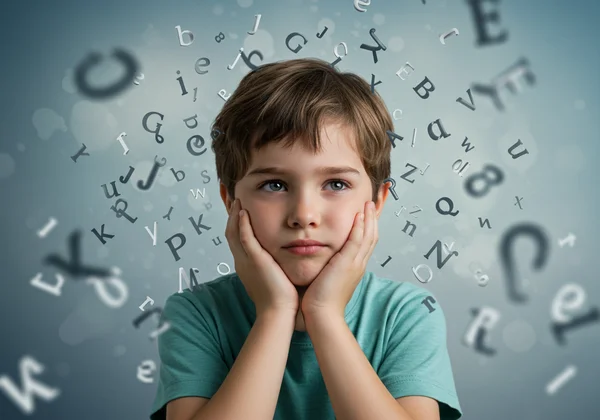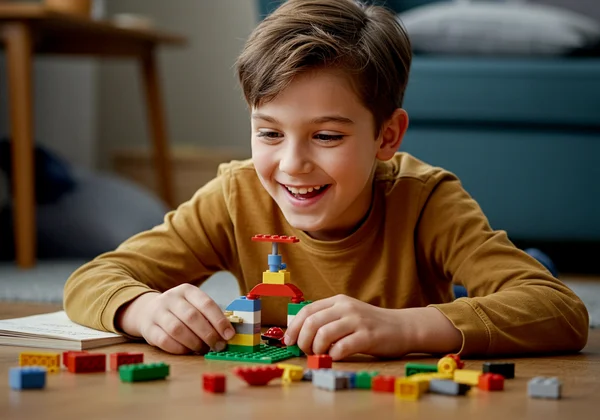Dyslexia & Child Confidence: Nurturing Emotional Support
September 15, 2025 | By Clara Finch
The struggles a child with dyslexia faces often extend far beyond the classroom. While missed words and jumbled letters are visible signs, a deeper, hidden battle is frequently waged against feelings of frustration, anxiety, and self-doubt. These reading challenges can significantly impact more than just grades; they can erode a child’s confidence and emotional well-being. As a parent, you might be wondering, how can you help a child with dyslexia build resilience and maintain a positive self-image? Offering the right emotional support is key to helping your child through their dyslexia journey, and the first step is understanding the full picture. Getting clear answers is a powerful first step. Consider taking a quick, start a free dyslexia screening to gain initial insights.
Understanding the Emotional Impact of Dyslexia
Dyslexia is a learning difference, not a measure of intelligence. However, in a world where academic performance is often highlighted, children with dyslexia can start to feel "less than" their peers. This constant struggle to keep up can take a significant emotional toll, leading to what is often called the "dyslexia emotional roller coaster." Understanding this connection is vital for providing effective support and fostering a healthy learning environment.

Recognizing the Signs of Emotional Distress in Children
Children may not always have the words to express their inner turmoil. Instead, their emotional distress often manifests in their behavior. You might notice your child avoiding reading aloud, having sudden emotional outbursts before homework time, or complaining of stomachaches to miss school. Other signs can include increased irritability, withdrawal from friends and activities they once enjoyed, or a pervasive sense of sadness. These aren't signs of defiance but cries for help, signaling that the academic pressure is spilling over into their emotional health.
How Dyslexia Affects Self-Perception and Motivation
Imagine trying your absolute hardest every single day, only to fall behind your classmates. This is the reality for many children with dyslexia. This persistent struggle can lead to a damaged self-perception, where children internalize their difficulties and start believing they are not smart. This belief can crush their motivation to learn, creating a cycle of avoidance and failure. They may develop "learned helplessness," feeling that no amount of effort will lead to success, which can impact their willingness to try new or challenging things.
Boosting Child Self-Esteem with Dyslexia
Nurturing your child's self-esteem is one of the most powerful actions you can take. A strong sense of self-worth acts as a shield, protecting them from the negative feelings associated with their learning challenges. By focusing on their strengths and creating a positive atmosphere, you can help them see themselves as capable, resilient individuals. This shift in perspective is crucial for their long-term child self-esteem dyslexia journey. If you're looking for initial insights, a free dyslexia screening can be an invaluable tool.
Celebrating Strengths and Talents Beyond Academics
Every child has a unique set of talents. Perhaps your child is a gifted artist, a natural athlete, a creative problem-solver, or has a remarkable sense of empathy. It is essential to identify and celebrate their strengths that exist outside of reading and writing. Enroll them in activities where they can shine, whether it's a sports team, art class, or coding club. When they experience success and receive praise in these areas, it builds a foundation of confidence that proves their worth is not solely defined by their academic abilities.

Creating a Supportive and Understanding Home Environment
Your home should be a safe harbor from the pressures of school. Fostering a supportive home environment means practicing open communication and unconditional love. Talk about dyslexia openly, explaining that it’s just a different way of learning. Share stories of successful people with dyslexia, like Albert Einstein or Steven Spielberg, to show them they are in great company. Praising effort over outcome is also key; celebrate their hard work and perseverance, regardless of the final grade on a test.
Effective Parenting Strategies for Dyslexia Challenges
Navigating the daily hurdles of dyslexia requires a toolkit of effective strategies. As a parent, you are your child's primary advocate and coach. Implementing specific parenting dyslexia techniques can empower your child to manage their emotions and approach learning with a more positive outlook. These strategies are not about "fixing" dyslexia but about providing the tools to thrive with it.
Teaching Coping Mechanisms for Frustration and Anxiety
Frustration and anxiety are common companions for a child with dyslexia. Instead of telling them to "calm down," teach them practical coping mechanisms. This could include deep breathing exercises when they feel overwhelmed, taking short "brain breaks" during homework, or using a stress ball. Help them break down large tasks into smaller, manageable steps to make assignments feel less daunting. By equipping them with these tools, you give them a sense of control over their emotional responses.

Collaborating with Teachers and School Staff for Support
Building a strong partnership with your child's school is non-negotiable. Proactive school collaboration ensures that your child receives consistent support in all environments. Schedule regular meetings with teachers to discuss your child’s progress and challenges. Share what works at home and ask for their insights from the classroom. Together, you can create an Individualized Education Program (IEP) or a 504 plan that provides accommodations like extra time on tests or access to audiobooks, leveling the playing field for your child.
Fostering Overall Emotional Well-being for Dyslexic Learners
Beyond academic support and self-esteem boosters, the ultimate goal is to nurture your child's complete emotional health. This means helping them develop a balanced life where their identity is not solely tied to their learning difference. A child who is emotionally healthy is better equipped to handle challenges, build meaningful relationships, and pursue their passions with confidence. An online dyslexia test can provide a starting point for understanding their unique profile.
Encouraging Hobbies and Interests for Positive Outlets
Hobbies offer a fantastic escape and a powerful way to build skills and social connections. Encouraging hobbies gives your child a space where they can feel successful and relaxed, free from academic pressure. Whether it’s learning a musical instrument, joining a drama club, or building intricate LEGO models, these activities foster creativity, discipline, and joy. They serve as positive outlets for stress and are crucial for developing a well-rounded personality.

Cultivating a Growth Mindset in Dyslexic Children
One of the most profound gifts you can give your child is a growth mindset—the belief that abilities can be developed through dedication and hard work. Coined by psychologist Carol Dweck, this concept is transformative for children with dyslexia. Teach them to see mistakes as learning opportunities and challenges as puzzles to be solved. Replace phrases like "I can't do it" with "I can't do it yet." This simple shift in language fosters resilience and transforms their entire approach to learning and life.
Empowering Your Child: Take the Next Step Towards Understanding
Supporting a child with dyslexia is a journey that goes far beyond flashcards and phonics. It's about nurturing their heart as much as their mind. By understanding the emotional impact, boosting their self-esteem, implementing effective strategies, and fostering their overall well-being, you empower them to unlock their full potential.
Knowing is the start of making a difference. If you're wondering if your child's reading difficulties point to dyslexia, our free online dyslexia test can provide immediate insights. Take it today to better understand their unique profile and discover personalized guidance for what to do next.
Frequently Asked Questions About Dyslexia and Emotional Support
How can I help my child with dyslexia manage their frustration?
Helping a child with dyslexia manage frustration involves both proactive and in-the-moment strategies. Proactively, ensure their homework environment is calm and break tasks into small chunks. In the moment, teach them to recognize their frustration triggers and use coping mechanisms like taking a five-minute break, practicing deep breathing, or squeezing a stress ball. Acknowledge their feelings by saying, "I can see this is really frustrating," to validate their experience before helping them find a solution.
What are the early emotional signs of dyslexia in children?
The early emotional signs can be subtle. A young child, like a 7-year-old, might exhibit an unusual reluctance to go to school, become withdrawn in class, or express anxiety about reading activities. You may also notice low self-esteem, with comments like "I'm dumb," or increased frustration and anger, especially surrounding schoolwork. These behaviors are often a direct result of the confusion and difficulty they experience when trying to decode language.
Is an online dyslexia screening test accurate for identifying potential emotional impacts?
An online dyslexia test is a highly valuable screening tool designed to identify potential risks and characteristics associated with dyslexia. While it doesn't directly measure emotional impact, the results can provide crucial context. Understanding that a child is at high risk for dyslexia helps parents and educators connect behavioral issues like anxiety or low confidence to their learning challenges, rather than misinterpreting them. It's the essential first step in a comprehensive approach to support. For a reliable assessment, you can view your dyslexia screening report here.